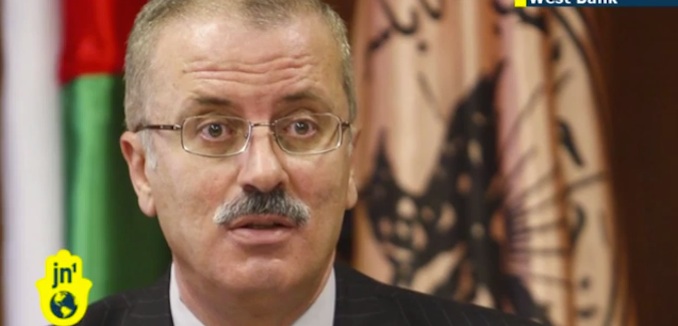Palestinian Authority (PA) President Mahmoud Abbas on Thursday officially asked sitting Prime Minister Rami Hamdallah to lead a planned government agreed to by the rival Fatah and Hamas factions, as analysts expressed deepening worries that the terms of the unity deal would lock in an unprecedented arrangement fundamentally altering the status of Palestinian governance:
Both Palestinian parties see benefits to a unity pact.
Limping under a strict blockade by neighbours Israel and Egypt, the Hamas government in Gaza has struggled to prop up the economy and pay its 40,000 employees.
Abbas, shifting his strategy after the peace talks collapsed last month, is seeking to shore up his domestic legitimacy since his mandate expired in 2009.
Such concerns – under which Abbas has been described as throwing a lifeline to Hamas amid what has otherwise been a downward spiral – have been one of at least three dynamics that observers have found troubling. Abbas has also been blasted for risking the financial viability of any Palestinian government, inasmuch as moves to embrace Hamas risk running afoul of blackletter American conditions on financial assistance. The economy in Fatah-controlled portions of the West Bank would collapse without outside aid.
Recent days have also seen increasing focus on the security arrangements of the unity agreement, which will allow Hamas to maintain control over its security forces and its arsenal of tens of thousands of Iran-supplied rockets and missiles. The arrangement had already been dubbed a “Hezbollah model” by analysts.
On Wednesday Matthew Levitt and Neri Zilber – respectively the director of The Washington Institute’s Stein Program on Counterterrorism and Intelligence and a visiting scholar at the Institute – assessed the situation:
In this regard, Hamas is likely following the well-worn and successful path of the militant Lebanese Shiite group Hezbollah. Following the 2007 takeover of Gaza, Qassam Brigade commanders reorganized their loosely structured underground militia into a formal security service with advanced weapons such as missiles, rockets, and even unmanned aerial vehicles. Hamas is now loath to relinquish these military capabilities and is likely trying to negotiate an arrangement in which it retains its arsenal and independent “resistance” militia even as its members participate in the unity government — similar to Lebanon, where Hezbollah ministers serve in government. “Hamas wants to avoid ministerial responsibility for civilian matters,” one unnamed group official recently remarked, “but it wants to maintain its power as a popular-resistance group.”
[Photo: JewishNewsOne / YouTube]




